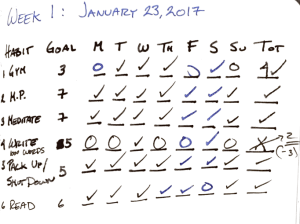the hidden cost of habit creep
2017-05-16
|~2 min read
|399 words
Habits are a way to automate certain decisions to make space for the bigger ones. They are not, however, a panacea - a lesson which became painfully obvious recently.
Every week when I plan my week I set my expectations down on paper. These include what progress I want to make on projects, but also a series of activities I want to make sure that I do (i.e. habits).
 |
|---|
| Habit Tracking Grid: Week 1 |
Early success with the project gave me confidence and until more recently, I had experienced only minor hiccups. Consequently, I added to the list with some regularity.
An early design decision to only list the number of occurrences rather than the amount of time needed helped to obscured just how big the list had grown for a long time. The thought was that if these were truly important, then I would make time.
Two less than stellar weeks followed by a week when I did not even complete the exercise of setting down my expectations forced me to look more deeply at my list. That’s when I realized just how easily habit creep can happen.
My list, which appeared reasonable on its face, was almost 40 hours of work. I had created a “full time” job in my spare time.
Habits are easily to accumulate, just like subscriptions, but while it makes sense to review your list of subscriptions from time to time (after all - they cost money), it’s less intuitive to look at our habits.
To prevent habit creep going forward, ironically, I’ve created the habit of reviewing them monthly by incorporating it into the process I already had in place for my other subscriptions.
I have undoubtedly become more productive since I started planning and tracking my habits. They have done their job and helped me figure out what to do next with minimal effort and I can reflect on the tangible progress I’ve made in areas that had been dormant for years. However, habits, like most things, become not only less effective, but actually detrimental in excess.
The process of reviewing my habits is forcing me to evaluate my priorities by making me aware of the opportunity cost for cultivating certain areas of my life. A few weeks of over-extension seems a fair price to pay for a lesson in identifying what matters to me.
Hi there and thanks for reading! My name's Stephen. I live in Chicago with my wife, Kate, and dog, Finn. Want more? See about and get in touch!